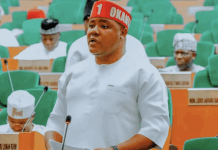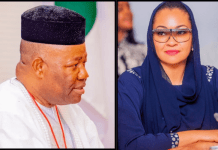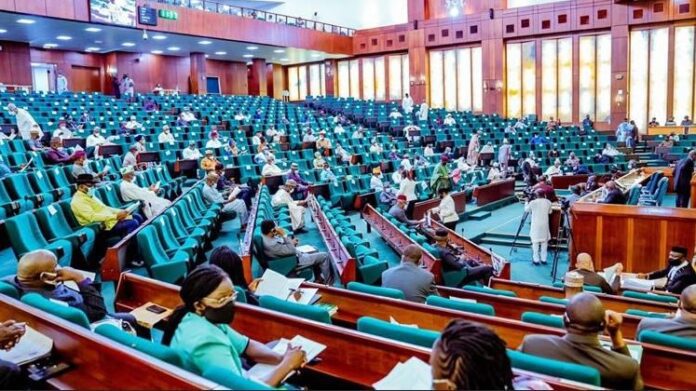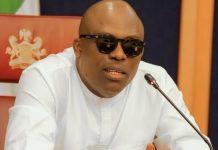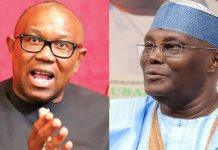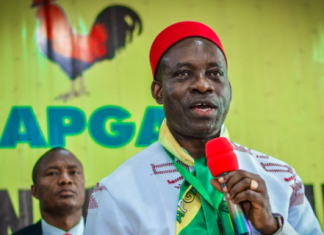The planned N26 trillion in spending and the $73.76 oil benchmark for the 2024 fiscal year, as contained in the 2024–2026 Medium Term Expenditure Framework (MTEF) and Fiscal Strategy Paper (FSP), were approved by the House of Representatives on Tuesday.
After the recommendations of the joint Committees on Finance, National Planning and Economic Development and Aid, Loans and Debt Management were adopted, the resolution was passed, as stated by Hon. James Abiodun Faleke.
The House approved the suggested oil benchmark prices of $73.96, $73.76, and $69.90 per barrel for 2024, 2025, and 2026, respectively, after giving careful consideration to the proposals made by the Ministries, Departments, and Agencies (MDAs).
The Nigerian National Petroleum Corporation Limited (NNPCL) must certify actual and verifiable deliveries before the House can approve daily crude oil output of 1.78 Mbps, 1.80 Mbps, and 1.81 Mbps for the years 2024, 2025, and 2026, respectively.
Along with approving the Executive’s recommended Exchange Rates of N700, N665.61, and N669.79 to US$1 for the years 2024–2026, the parliamentarians cautioned that the Federal Government should continue its strong efforts to improve domestic production (oil and non-oil) in order to support the growth of the foreign reserve.
The MPs also asked the federal government to make sure that “all locally produced goods should be categorically prohibited from being imported and customs tariffs adjusted accordingly.”
They also gave the Central Bank of Nigeria (CBN) the responsibility of guaranteeing that banks have access to foreign exchange so they can pay importers and other customers and avoid using the parallel market.
With the Federal Government responding with budgetary measures to boost the economy through large investments in SMEs, infrastructure, and the agricultural sector, parliamentarians authorized GDP growth rates of 3.76%, 4.22%, and 4.78% for 2024, 2025, and 2026.
Inflation rates of 21.40% in 2024, 20.30% in 2025, and 18.60% in 2026 were likewise authorized by the House.
During his remarks on the report’s summary, Hon. Faleke noted that the proposed spending of N26 trillion, of which N16.9 trillion was retained, would result in new borrowings of N7.8 trillion (including borrowing from abroad and domestic sources), a 49% debt service to revenue ratio, N1.2 trillion in pension, gratuities, and retiree benefits, and a N9 trillion fiscal deficit (including GOEs) if the framework for revenues and expenses is followed.
If the relevant National Assembly Committees monitor revenue effectively and exercise oversight, the predicted N16.96 trillion in revenues to the Federal Government for the 2024 fiscal year can be achieved.
He claims that the proposed fiscal deficits of N9.048 trillion, N10.02, and N11.48 for the fiscal years 2024, 2025, and 2026 are, respectively, 22%, 13.6%, and 1% less than the N11.6 trillion fiscal deficit for 2023.
In order to reduce deficit financing in 2024, the government is proposing to decrease funding from domestic borrowing and multilateral and bilateral project-tied loans and boost funding from privatization revenues and foreign borrowing.
The speaker additionally observed that the Federal Government’s dedication to gradually restructuring its debt portfolio in order to attain a balanced ratio of domestic to external debt is apparent in the 2024-2026 MTEF and FSP.
He regretted that a sizable portion of the revenue-generating agencies under the federal government were spending money carelessly, frivolously, and above budget.
The absence of punitive sanctions in the Fiscal Responsibility Act of 2007 has led to the majority of Revenue Agencies violating the Act, as noted by Hon. Faleke.
While acknowledging that the majority of agencies do not adhere to financial reporting standards, Hon. Faleke claimed that certain RGAs were involved in joint ventures, particularly in the oil and gas industry where Forward Sales Agreements are signed in exchange for upfront payments for future product delivery without the National Assembly’s intervention. The Federal Government was bound by a staggering $40 million Take Or Pay agreement each month by power purchase agreements signed by NBET and NDPHC in the power sector, despite the agencies’ full knowledge of the nation’s limitations in fulfilling its obligations under the agreements. This trend was also noted in other industries.
Read Also: Service Chiefs, IGP appear before Reps for sectoral debate on closed-door security
He contends that these kinds of agreements expose the nation to enormous contingent liabilities; the government’s contingent liabilities are projected to be N6.9 trillion in 2024 alone, and N7 trillion in 2025 and 2026, respectively. The country is also vulnerable to international arbitrations.
The lawmakers made the following observation while discussing the contingent liabilities table: most of these agreements were never brought before the National Assembly for consideration, so they were governed by international laws or legal systems. The above contingent liabilities, they noted, are the result of various agreements signed on behalf of the Federal Government of Nigeria by various GOEs/MDAs and some states but guaranteed by the Federal Government of Nigeria.
Information and communication technology (ICT) is not being used properly by several organizations, especially those in charge of collecting stamp duties, according to observations made by the parliamentarians.
The Committee also bemoaned the fact that NIPOST was the parent company of NIPOST Properties Limited and NIPOST Transport and Logistics Limited, but that NIPOST as an organization did not get any shares from the creation of these subsidiaries, which were owned by private people.
He noted that, in 2022, the Ministry of Finance released N10 billion for restructuring and recapitalization, but no matching outcome was seen.
The House further stated that the projected tax waivers to be given in 2024 are N 2.7 trillion, N 3.2 trillion, and N 3.8 trillion, despite the deficit budget. These make for 31%, 32%, and 30% of the overall budget deficit in 2024, 2025, and 2026, respectively.
Join Television Nigerian Whatsapp Now
Join Television Nigerian Facebook Now
Join Television Nigerian Twitter Now
Join Television Nigerian YouTUbe Now

